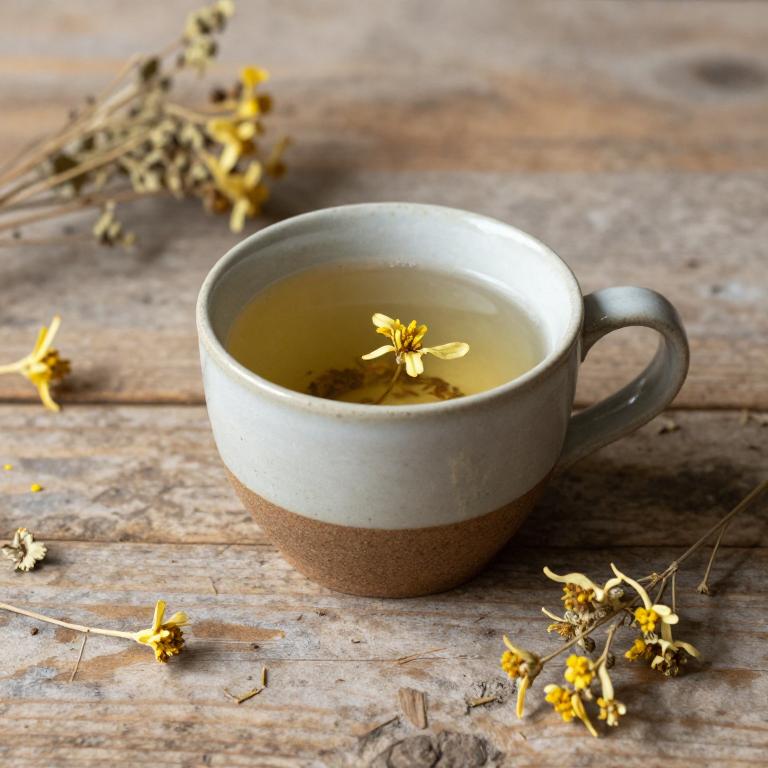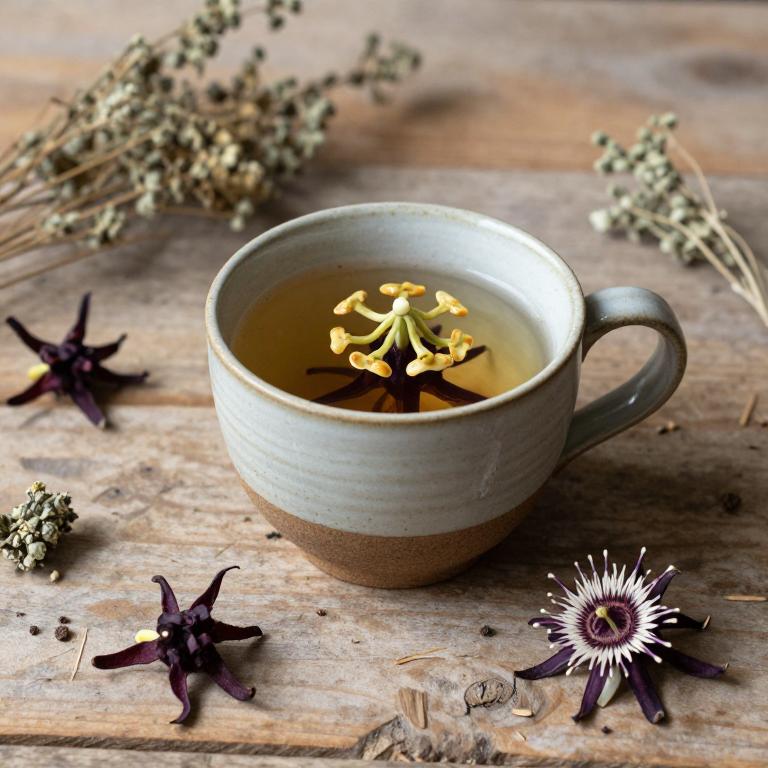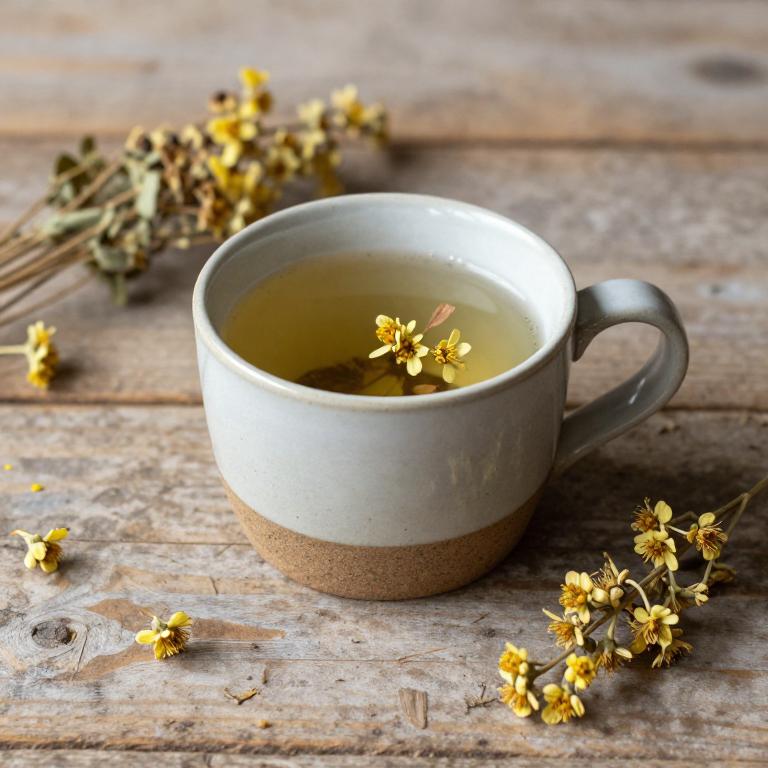10 Best Herbal Teas For Grief

Herbal teas can offer a gentle and soothing remedy for those navigating the complex emotions of grief.
Ingredients like chamomile, lavender, and lemon balm are known for their calming properties, helping to ease anxiety and promote relaxation. These teas can provide a moment of peace and mindfulness, allowing individuals to process their emotions in a comforting way. Some herbal blends also support emotional resilience and may aid in the healing process by encouraging emotional release and balance.
While not a substitute for professional support, herbal teas can be a complementary tool in managing the emotional challenges of grief.
Table of Contents
- 1. Valerian (Valeriana officinalis)
- 2. Maypop (Passiflora incarnata)
- 3. St. john's wort (Hypericum perforatum)
- 4. Licorice (Glycyrrhiza glabra)
- 5. English lavender (Lavandula angustifolia)
- 6. Chamomile (Matricaria chamomilla)
- 7. Lemon balm (Melissa officinalis)
- 8. Yarrow (Achillea millefolium)
- 9. Echinacea (Echinacea purpurea)
- 10. Dog rose (Rosa canina)
1. Valerian (Valeriana officinalis)

Valeriana officinalis, commonly known as valerian, is a traditional herbal remedy often used to support emotional well-being and promote relaxation.
Its calming properties make it a popular choice for herbal teas intended to ease the emotional burden of grief, as it may help reduce anxiety and improve sleep quality during difficult times. The root of the plant contains compounds like valerenic acid, which are believed to interact with the brain's neurotransmitters to produce a soothing effect. While not a substitute for professional grief counseling, valerian tea can be a comforting complement to a holistic approach to emotional healing.
However, it is important to consult with a healthcare provider before using valerian, especially for those with existing health conditions or taking other medications.
2. Maypop (Passiflora incarnata)

Passiflora incarnata, commonly known as passionflower, has been traditionally used in herbal teas to support emotional well-being, particularly during times of grief.
The plant contains compounds such as flavonoids and alkaloids that may help calm the nervous system and reduce anxiety, making it a soothing option for those navigating emotional distress. Its mild sedative properties can promote relaxation and improve sleep, which is often disrupted during periods of profound loss. When brewed as a tea, passionflower offers a gentle, natural way to ease the emotional weight of grief without the side effects of pharmaceuticals.
While it is not a substitute for professional counseling, it can serve as a complementary tool to support emotional healing and resilience.
3. St. john's wort (Hypericum perforatum)

Hypericum perforatum, commonly known as St. John's Wort, has been traditionally used in herbal teas to support emotional well-being, particularly in managing symptoms of grief and mild depression.
The plant contains bioactive compounds such as hyperforin and hypericin, which are believed to influence neurotransmitter levels in the brain, potentially improving mood and reducing feelings of sadness. When brewed into a calming herbal tea, St. John's Wort can offer a soothing and aromatic experience that may help ease the emotional burden of loss. However, it is important to note that while it may provide some relief, it should not replace professional mental health support, especially for individuals experiencing severe or prolonged grief.
As with any herbal remedy, it is advisable to consult a healthcare provider before use, particularly if taking other medications, due to potential interactions.
4. Licorice (Glycyrrhiza glabra)

Glycyrrhiza glabra, commonly known as licorice root, has been traditionally used in herbal medicine for its soothing and anti-inflammatory properties.
When brewed into a tea, it can help ease the physical and emotional symptoms associated with grief, such as stress, anxiety, and fatigue. The mild sweetness of licorice root tea provides a calming effect, promoting a sense of comfort and emotional balance. It is often combined with other calming herbs like chamomile or lemon balm to enhance its therapeutic benefits.
While not a substitute for professional grief counseling, licorice root tea may offer gentle support during the healing process.
5. English lavender (Lavandula angustifolia)

Lavandula angustifolia, commonly known as English lavender, is often used in herbal teas to support emotional well-being, particularly during times of grief.
Its calming aroma and mild sedative properties help reduce anxiety and promote a sense of peace, making it a gentle aid for those processing loss. The tea is typically made by steeping dried lavender flowers in hot water, resulting in a soothing drink that can be enjoyed throughout the day. Many people find comfort in its earthy, floral flavor, which can offer a sense of grounding and reassurance.
While it is not a substitute for professional grief counseling, lavender tea can be a comforting complement to self-care practices during difficult emotional periods.
6. Chamomile (Matricaria chamomilla)

Matricaria chamomilla, commonly known as chamomile, is a gentle herbal tea often used to support emotional well-being, including during times of grief.
Its calming properties are believed to help ease anxiety and promote relaxation, which can be particularly beneficial for those processing loss. Chamomile contains compounds like apigenin, which may interact with brain receptors to reduce stress and improve mood. While it is not a substitute for professional grief counseling, it can serve as a complementary tool to aid in emotional healing.
Drinking chamomile tea in small amounts may offer soothing relief, helping individuals find comfort in moments of sorrow.
7. Lemon balm (Melissa officinalis)

Melissa officinalis, commonly known as lemon balm, is a gentle herbal remedy often used in herbal teas to support emotional well-being, particularly during times of grief.
Its calming properties help soothe anxiety and promote a sense of peace, making it a comforting choice for those navigating emotional distress. The mild, citrusy scent of lemon balm can also help ease tension and improve mood, offering a natural way to manage stress and sadness. When brewed as a tea, it is typically consumed warm, allowing its soothing effects to be absorbed slowly throughout the day.
While it is not a substitute for professional counseling, lemon balm tea can serve as a complementary tool to support emotional healing and resilience during the grieving process.
8. Yarrow (Achillea millefolium)

Achillea millefolium, commonly known as yarrow, has been traditionally used in herbal medicine for its calming and soothing properties, making it a potential remedy for emotional distress, including grief.
This herb contains compounds such as flavonoids and essential oils that may help reduce anxiety and promote emotional balance, offering gentle support during periods of sorrow. When brewed into a tea, yarrow can be consumed warm, allowing its mild, earthy flavor to aid in easing the emotional weight of loss. While it is not a substitute for professional counseling, it can serve as a complementary tool to help individuals process grief more gently.
As with any herbal remedy, it is advisable to consult a healthcare provider, especially for those with existing health conditions or on medication.
9. Echinacea (Echinacea purpurea)

Echinacea purpurea, commonly known as purple coneflower, is traditionally used in herbal teas to support the immune system and promote overall wellness.
While it is not a substitute for professional grief counseling, some individuals find comfort in its calming properties during times of emotional distress. The mild bitterness of echinacea tea may help ground the mind and encourage a sense of resilience. It is often recommended to drink it in small amounts, paired with other herbs like chamomile or lavender for a more soothing effect.
However, it is important to consult with a healthcare provider before using echinacea, especially for those with allergies or chronic health conditions.
10. Dog rose (Rosa canina)

Rosa canina, also known as rosehip, is a herbal tea that has been traditionally used to support emotional well-being, including during times of grief.
The tea is rich in antioxidants, vitamins, and anti-inflammatory compounds, which may help to calm the nervous system and reduce stress. Many people find comfort in its gentle, floral aroma and warming properties, which can provide a sense of solace and emotional balance. While it is not a substitute for professional grief counseling, it can be a comforting addition to self-care routines.
Drinking Rosa canina tea in small amounts throughout the day may help ease the emotional burden of loss and promote a more peaceful state of mind.